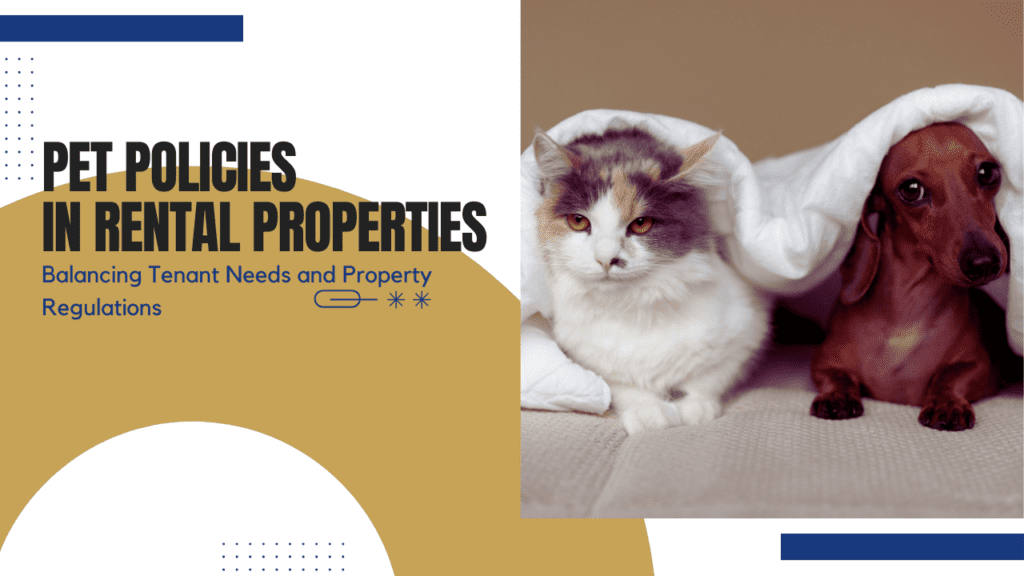
Pets are good for rental properties.
This isn’t a statement that all owners and investors agree with. Sometimes, the potential risk and liability prevents a rental property owner from allowing pets into their properties. However, we believe that pets can help you earn more money on your investment. You’ll face lower vacancy times, and there’s less turnover. You’ll also collect a pet fee and/or pet rent.
We understand the hesitation you might feel; animals can cause damage or increase liability. What if a tenant’s dog bites a neighbor? What if it’s impossible to eliminate the cat scratches on a door?
Here’s the thing: a majority of tenants in DeKalb County have at least one pet. More than 50 percent of the tenants looking for a home at any given time have at least one dog or cat. So, if you don’t allow pets in your property, you are effectively eliminating more than half of your tenant pool. That can end up costing you more money than any pet damage would.
A strong pet policy can keep you and your property protected while attracting a larger pool of tenants. Here’s how we work with owners and landlords to balance tenant needs and property protection.
Screening and Documenting Pets in Atlanta Rental Properties
One way to protect yourself against potentially damaging pets is by screening them.
You can and should screen pets as carefully as you screen tenants.
There are services that will screen pets for you, where vet records will be collected and vaccinations will be verified. When you work with an Atlanta property management company to find and place tenants in your property, you can also count on a robust screening process for pets as well as people.
Ask for a photo of the pet so if you see an animal around the property, you’ll know it’s the pet you screened and approved. You can even ask to meet the pet.
Part of any rigorous screening process is talking to former landlords about how the tenant performed while living in their properties. After you’ve asked if rent was paid on time and the home was taken care of, ask about the pet. Were there any excessive messes? Was there damage? Did neighbors complain about the pet?
Limiting Size, Age, and Breed
While allowing pets, or even considering pets, you can place whatever restrictions you want on the pets you’ll allow. This is an essential part of a strong and protective pet policy. You’re still allowing tenants to move into the property with their pets, but you’re limiting the number of pets and setting boundaries around size, age, and breed. It’s an excellent balance.
In your pet policy, you can:
- Limit types of pets. You don’t have to allow potbelly pigs or exotic reptiles. Maybe you’ll allow dogs but not cats. Decide what kinds of pets you’re comfortable with, and write your inclusions and exclusions into your pet policy.
- Limit the number of pets you’ll allow. For example, you can place a two-pet maximum.
- Set an age range for the pets you’ll allow. Puppies and kittens are often not house-trained. So, you can say that you’ll only allow adult dogs and cats.
- Restrict size. If you’re renting out a one-bedroom condo that’s 500 square feet, you can require that all dogs and cats are under 10 pounds.
This is your property and your pet policy; make whatever restrictions help you feel comfortable but still open your property up to a large number of potential tenants. Restrictions such as these will balance tenant needs and the needs of your investment.
Let’s talk about dog breeds.
This can be a touchy subject, especially for your tenants who insist their three Pit Bulls are the sweetest, most docile animals you’ve ever met. That may be true. It doesn’t always matter to your insurance company.
Be careful of the breeds that are considered dangerous, such as Pit Bulls and German Shepherds. A lot of property insurance companies keep a list of what they consider to be dangerous dog breeds, and they won’t cover your property if such an animal is in residence. If you want to exclude these types of animals, make sure you include the list of breeds you won’t consider in your lease.
Pet Policies Must Reference Pet Fees and Pet Rent
Always charge a deposit or a pet fee to further protect yourself and your property. If you charge a deposit, you’ll need to give that money back at the end of the tenancy once you have confirmed no property damage was done. If you charge a pet fee, it’s non-refundable.
Some landlords also charge pet rent. In addition to your pet fee, you might charge $25 to $100 per month per pet. There are different ways to protect yourself financially when you have a tenant with pets moving into your property.
When Dogs and Cats Aren’t Pets: Service and Support Animals
 It’s important to understand that service animals and emotional support animals are not pets. The law sees them as legal accommodations that must be made for tenants who have disabilities.
It’s important to understand that service animals and emotional support animals are not pets. The law sees them as legal accommodations that must be made for tenants who have disabilities.
You are legally prohibited from denying a service or emotional support animal, and you cannot charge any type of pet fee, pet deposit, or pet rent. This is important to understand, because you can get into some expensive legal trouble if you violate the protections in place for people who need service and support animals.
Make sure you know the law, and dig a little deeper to make sure you understand the difference between a service animal and a companion animal. The law sees them differently and while you’re still required to allow both types of animals, there are different restrictions on what you can ask and the documentation that you can collect.
Pets can be tricky, but we suggest you allow them with a strong pet policy included as an addendum to your lease agreement. We can help with this, so please don’t hesitate to contact us at Silas Frazier Realty with any questions.
Silas Frazier Realty serves rental property owners in Atlanta, Snellville, Stone Mountain, Lilburn, Conyers, Smyrna, Marietta, Lithonia, Jonesboro, McDonough, Vinings, Brookhaven, and Tucker.
